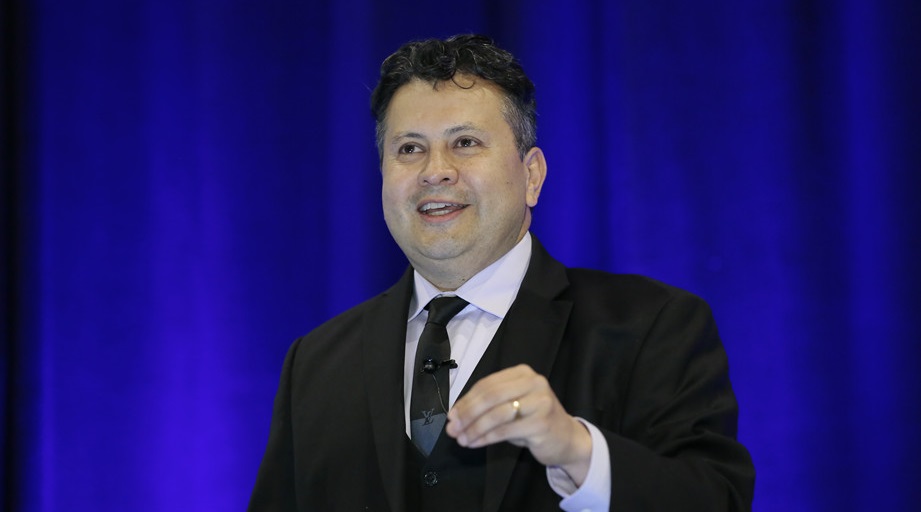
Emergency physician and healthcare artificial intelligence (AI) strategist Harvey Castro kicked off ASHP's first-ever AI summit with an enthusiastic presentation on the technology's current and potential uses in healthcare.
"This is going to change medicine. This is going to change the way we do things," Castro told attendees at the June 9 AI summit spotlight session, held at ASHP Pharmacy Futures 2024 in Portland, Oregon.
Intelligence-based medicine
Castro described AI, properly implemented, as “intelligence-based medicine” that helps the healthcare enterprise grow and innovate.
With AI, he said, “we’re going to be able to do things that we couldn’t do. ... And we’re going to be able to get our knowledge base, a lot quicker, to where we want to go.”
He said AI already has potential applications in drug development, medical records management, diagnosis and triage, clinical education, and patient communications.
A helping hand
Castro emphasized that medical data double every 30 days, making it impossible for clinicians to keep up with every advance. But by using AI tools in conjunction with their own clinical experience, clinicians can stay abreast of important advances in care.
Castro also said AI tools like ChatGPT can make healthcare more efficient by automating tasks, such as creating personalized patient education and discharge instructions.
He said 13 minutes — the average time of an office visit — doesn’t allow for much dialogue with patients. But a clinician’s ChatGPT virtual assistant, he said, “has infinity of time” to respond to patients’ questions.
Dr. Google is in
Castro said the public already has access to AI through products like ChatGPT and search engines with integrated AI features. These tools allow patients to ask medical questions and receive answers.
Sometimes, that works. Castro said he was struck by the story of a family whose four-year-old child had been seen by 17 healthcare providers over three years in search of an explanation for the child’s chronic pain. After uploading the child’s medical information into ChatGPT, the parents received a potential diagnosis of tethered cord syndrome, which was subsequently confirmed by a neurosurgeon.
Castro described this situation as an amazing use of AI. But he cautioned against using the technology to self-diagnose.
“Make sure you converse with the professional,” he said. “Make sure that whatever output the computer’s giving, that you verify it with the expert.”
And he emphasized that AI alone or human expertise alone aren’t as powerful as “AI plus human.”
Standard of care
As AI becomes integrated into radiology, Castro said, there’s the potential for the technology to read a brain scan, determine that a patient has suffered a stroke, and quickly initiate the cascade of care, leading to a better clinical outcome.
“That’s going to save lives,” he said. But he cautioned against adopting AI products as the standard of care in any discipline without ensuring that the tools work as intended.
“We need to have healthcare professionals evaluate these tools,” he said. “We need to be a part of it.”
To help get there, he said, “we need our own AI that is trained with medical data, that is trained with current publications that we recognize, and that is reinforced” by clinicians with the appropriate expertise.
Upsides and a few cautions
Castro is overwhelmingly positive about AI, and he has embraced the technology in his own professional life. His spotlight session showcased an AI-generated coloring book for children that explains how to use an inhaler; virtual AI patient engagement tools; AI-enabled eyeglasses; an AI fall-prevention tool; and a wearable AI assistant for patients.
Castro also showed the audience his virtual AI physician twin, created with his cloned voice and face as a creative way to leverage himself as a healthcare resource.
Castro said he does worry that clinicians may become overly dependent on AI and spend less time “putting hands on patients.” He’s also concerned about AI misinterpreting data and producing unexpected results or hallucinations or providing biased or outdated results. The technology’s costs and carbon footprint are also a potential concern.
And he said healthcare providers need to make sure patients understand where and how AI is contributing to their care.
“If we’re using AI, we need to have a bill of rights for our patients,” Castro said. “We need to be transparent.”








